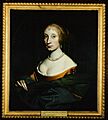Charles Maitland, 3rd Earl of Lauderdale facts for kids
Charles Maitland, 3rd Earl of Lauderdale (born around 1620 – died 9 June 1691), was an important Scottish nobleman. He was the second son of John Maitland, who was the 1st Earl of Lauderdale.
Maitland was born in a place called Lethington. Later, he became known as Charles Maitland of Haltoun. This happened after his father-in-law, Richard Lauder of Haltoun, passed away in 1675. However, Charles had actually received the lands of Haltoun much earlier, in 1660.
Contents
Early Career and Important Roles
Charles Maitland held many important jobs in Scotland. After King Charles II returned to the throne in 1660, Charles Maitland was given a big role. He became the main person in charge of The Mint for life. The Mint was where coins were made.
Helping the King and Parliament
In 1661, he was chosen to be a Privy Counsellor. This meant he advised the King on important matters. In 1669, he was elected as a representative for Edinburghshire in the Scottish Parliament. He also became a Lord of the Articles, which meant he helped prepare laws for the Parliament.
Becoming a Judge and Treasurer
In 1670, Charles Maitland became a judge in Scotland's highest court, the College of Justice. He was known as Lord Haltoun in this role. A year later, in 1671, he took on another key position as Treasurer-Depute. This meant he helped manage Scotland's money. He also became a main helper to his older brother, John Maitland, 1st Duke of Lauderdale, who was very powerful in Scottish politics.
Bearing the National Flag
In 1676, King Charles II gave Charles Maitland a special honor. He was granted the job of carrying the King's official symbols in Scotland. This was a very important ceremonial role.
The Bearer of the Saltire
Later, in 1952, it was officially decided that the Earl of Lauderdale's right was to carry the saltire. The saltire is Scotland's national flag, which has a white X on a blue background. Another noble, the Earl of Dundee, carries the Royal Standard, which shows the lion rampant.
Political Challenges and Fines
Charles Maitland faced some tough times in his political career. In 1679, a powerful nobleman, the Duke of Hamilton, complained to King Charles II about him. The Duke said that Lord Haltoun was "overbearing and insolent."
Facing Investigations
After his brother, the Duke of Lauderdale, lost power, Lord Haltoun's opponents started to challenge him. In 1681, he was accused of wrongdoing before Parliament. The case stopped when Parliament was adjourned. That same year, he was removed from his role of leading the Council when the Lord Chancellor and Lord Privy Seal were away. His financial accounts as Treasurer were also ordered to be checked.
The Mint Investigation
In 1682, a special group was formed to look into the coinage and The Mint, where Charles Maitland had been in charge. This group was mostly made up of his political enemies. Based on their report, he lost his jobs. He was then taken to court for mismanaging his duties.
The Large Fine
In 1683, the Court of Session (a high court) fined Charles Maitland and another person a huge amount of money: £72,000. This was a massive sum for that time. However, the King reduced the fine to £20,000. Most of this money went to the Lord Chancellor, and some went to Graham of Claverhouse, who later became a famous historical figure.
Family and Later Life
In 1683, Charles Maitland became the Earl of Lauderdale after his brother passed away. He was again made a Privy Counsellor in 1686.
Marriage and Inheritance
On 18 November 1652, Charles Maitland married Elizabeth Lauder. She was the younger daughter of Richard Lauder of Haltoun. Richard Lauder owned Haltoun House and a lot of land. Through this marriage, Charles Maitland and his family gained control of these properties.
A special agreement in 1660 stated that Charles Maitland and his male heirs from this marriage had to "take the name of Lauder and bear the Arms of Lauder of Haltoun." His second son, John Maitland, followed this rule and was known as Sir John Lauder. However, when John later inherited the Earldom of Lauderdale from his older brother, he changed his surname back to Maitland.
Children and Passing
The 3rd Earl of Lauderdale passed away at Haltoun House. He had six sons and two daughters. His oldest son, Richard Maitland, 4th Earl of Lauderdale, became the next Earl. His daughters were Isobel, who married John, 8th Lord Elphinstone, and Mary, who married Charles Carnegie, 4th Earl of Southesk.
Images for kids
 | Georgia Louise Harris Brown |
 | Julian Abele |
 | Norma Merrick Sklarek |
 | William Sidney Pittman |


